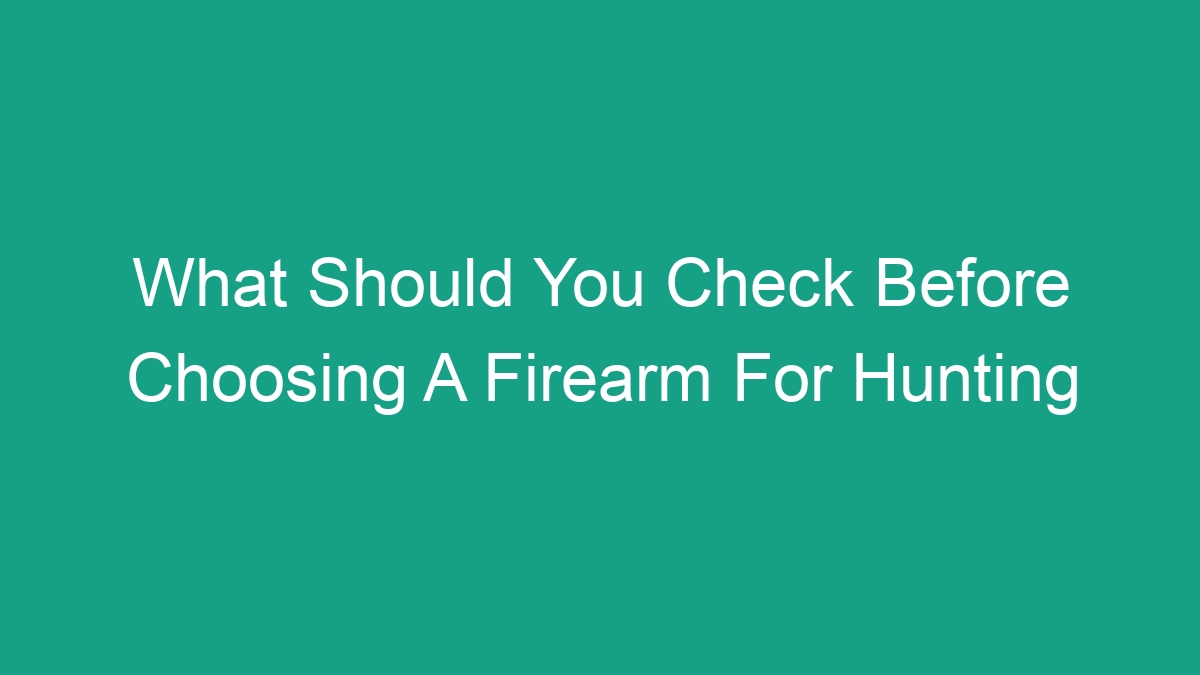
When it comes to hunting, one of the most crucial decisions you’ll make is choosing the right firearm. The right firearm can make a difference between a successful and enjoyable hunting experience and a frustrating one. Before making your decision, there are several factors you should consider to ensure you choose the right firearm for your hunting needs.
1. Determine the Type of Game You’ll Be Hunting
Hunting small game: If you’ll be hunting small game such as rabbits or squirrels, a .22 caliber rifle or a shotgun loaded with small game ammunition would be suitable.
Hunting big game: For larger game such as deer or elk, you’ll need a firearm with more stopping power. A rifle chambered in .30-06, .308, or .270 would be appropriate for big game hunting.
2. Consider the Range of the Hunt
The range of your hunt will also determine the type of firearm you’ll need. If you’ll be hunting in open fields where long-distance shots are common, a rifle with a longer effective range, such as a bolt-action rifle, would be suitable. For closer range hunting in dense woods, a shotgun or a lever-action rifle may be more appropriate.
3. Understand Your Shooting Ability
It’s important to be honest about your shooting ability. If you’re a beginner or not a confident shooter, you may want to choose a firearm with less recoil and easier handling, such as a smaller caliber rifle or a shotgun. For more experienced shooters, a higher caliber rifle may be suitable.
4. Consider the Terrain
The terrain where you’ll be hunting should also influence your choice of firearm. If you’ll be hunting in mountainous or rugged terrain, a lighter firearm that’s easier to carry would be advantageous. On the other hand, if you’ll be hunting in areas with long shooting distances, you may want a heavier, more stable firearm that can provide better accuracy.
5. Take Recoil into Account
Recoil can have a significant impact on your hunting experience. When choosing a firearm, consider the amount of recoil it produces and whether you can handle it comfortably. High recoil can affect your accuracy and potentially cause discomfort or injury, so it’s important to choose a firearm that you can handle effectively.
6. Check Local Regulations
Before making a purchase, it’s important to check local hunting regulations to ensure that the firearm you choose is legal for hunting in your area. Different jurisdictions have different laws regarding the type of firearms that can be used for hunting, so familiarize yourself with these regulations to avoid any legal issues.
7. Test Fire the Firearm
Once you’ve narrowed down your options, it’s crucial to test fire the firearms you’re considering. This will allow you to get a feel for the recoil, accuracy, and overall comfort of each firearm. Many gun shops or shooting ranges offer the opportunity to test fire firearms before making a purchase.
8. Consider Optics and Accessories
Depending on the type of hunting you’ll be doing, you may want to consider what optics and accessories are available for the firearms you’re considering. Some firearms may be compatible with scopes, red dot sights, or other accessories that can enhance your shooting experience. It’s important to factor in the cost and availability of these accessories when choosing a firearm.
9. Budget
Finally, consider your budget when choosing a hunting firearm. Firearms can range in price from a few hundred dollars to several thousand, so it’s important to set a budget and stick to it. Keep in mind that you may also need to budget for accessories, ammunition, and any additional training or certification that may be required.
By taking these factors into account, you can make an informed decision when choosing a firearm for hunting. Remember that the right firearm for you will ultimately depend on your individual hunting needs, preferences, and shooting abilities.



